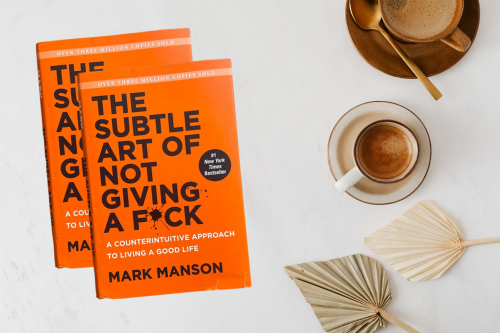Mark Manson‘s The Subtle Art of Not Giving a Fck breaks away from traditional self-help themes, which usually promote boundless optimism and constant positivity as essential paths to personal growth and happiness. Instead of advocating for constant joy or a life devoid of struggle, Manson offers a contrasting perspective emphasizing embracing discomfort, accepting hardship, and understanding that our most significant growth often arises from overcoming adversity. He challenges the pervasive cultural belief that happiness must be relentlessly pursued at all costs. Instead, he argues that embracing life’s inevitable struggles reveals the true path to growth, meaning, and emotional resilience.
Manson’s approach is refreshingly blunt and often irreverent. He does not offer a quick-fix, step-by-step guide to happiness or promote the familiar tropes of self-help literature, such as the power of positive affirmations, visualization exercises, or relentless optimism. Instead of promoting a “good vibes only” mentality, Manson argues that life inherently fills us with pain, disappointment, and challenges.
By confronting and accepting uncomfortable truths, it is believed that mental and emotional resilience can be developed, leading to a more meaningful life. He advocates for “selective attention”—focusing on the few things that truly matter rather than expending energy on everything that comes our way. It’s not about trying to make everything perfect, but rather, it’s about choosing what to care about and, just as importantly, what to let go of.

7 Key Takeaways for Personal Growth
1. The Concept of “Disappointment Panda” and the Importance of Facing Hard Truths
A cornerstone of Manson’s philosophy is that facing life’s hard truths head-on, rather than trying to avoid or sugarcoat them, is the key to growth. One of the more colorful metaphors he uses in the book is the “Disappointment Panda,” a character who serves as a superhero of sorts. Still, instead of delivering optimistic or encouraging messages, he bluntly and unapologetically delivers brutal, often disappointing truths. This character embodies Manson’s broader philosophy — that avoiding discomfort and pain leads to stagnation while acknowledging and accepting these unpleasant experiences can propel us toward greater emotional and psychological resilience.
Pain and hardship, Manson argues, are not only unavoidable, but they are also integral to personal development. Confronting life’s painful aspects provides valuable lessons, helping to make better decisions, develop more robust coping mechanisms, and lead more fulfilling lives. Manson’s message is clear: rather than chasing happiness at all costs, embrace the “good problems” — the challenges that arise from what truly matters to us. These challenges give our lives meaning and purpose; facing them head-on is far more rewarding than trying to chase an illusion of perpetual happiness.
2. The Dangers of Suppressing Negative Emotions
Another significant theme in The Subtle Art of Not Giving a Fck is Manson’s critique of the pervasive cultural obsession with positivity and the damaging effects of trying to suppress negative emotions. Manson argues that our culture often teaches us to avoid or “fix” any negative emotion, causing many people to dismiss or ignore their feelings instead of fully experiencing and understanding them. This suppression, according to Manson, does not make the negative emotions go away; instead, it makes us feel worse about ourselves, as it creates unrealistic expectations for happiness and emotional well-being.
Rather than trying to force ourselves to feel happy or positive at all times, Manson urges readers to accept that negative emotions—like sadness, frustration, anger, and disappointment—are natural and should be seen not as problems to eliminate but as valuable signals highlighting areas in life that may need change. In this context, negative emotions act as indicators, revealing underlying issues that may require attention, introspection, or action. Acknowledging and handling these emotions healthily becomes a powerful tool for personal growth and positive transformation.
3. Choosing Meaningful Values Over Empty Pursuits
Manson centers his approach on achieving personal growth by identifying and nurturing meaningful values—intrinsic values within our control and aligned with our true selves. Manson describes self-awareness as an “onion” with three layers: first, acknowledging our emotions; second, understanding the reasons behind those emotions; and third, identifying the core values that motivate those feelings.
By embracing values like integrity, honesty, self-respect, and kindness, a more resilient and grounded sense of self is built, less influenced by external validation. Manson is quick to point out that external values — such as wealth, popularity, or success — are fragile and fleeting, easily destabilized by external circumstances or the opinions of others. In contrast, internal values provide a much more stable foundation for personal growth that remains anchored regardless of life’s inevitable ups and downs.
4. The Problem with “Extraordinary” Expectations
In a world where social media and pop culture constantly bombard us with images of exceptional achievement and success, Manson offers a critical reminder: striving for “extraordinary” greatness can be detrimental to our well-being. In the modern age, where people constantly measure their lives against the curated highlights of others, it’s easy to fall into the trap of believing that anything less than extraordinary is not enough. Manson argues that this constant chase for recognition and validation only leads to exhaustion and dissatisfaction.
Instead, he suggests immense value in embracing the beauty of the ordinary and finding contentment in the small, everyday moments that constitute a meaningful life. Releasing the pressure always to be the best, the smartest, or the most successful allows us to experience life more fully without constantly measuring ourselves against unattainable standards. Shifting the focus from chasing extraordinary achievements to embracing a more authentic, grounded existence allows for cultivating a more profound sense of satisfaction and peace.
5. Building Resilience Through Acceptance of Life’s Challenges
Manson emphasizes that emotional resilience, much like physical strength, is developed through adversity. Just as muscles become stronger when stressed, our ability to bounce back from life’s challenges is fortified by confronting them directly. Avoiding discomfort or failure diminishes resilience while embracing mistakes and setbacks as chances for growth nurture a more adaptable and robust mindset. This perspective enables us to approach life’s inevitable ups and downs with greater ease, confidence, and emotional fortitude, fostering a deeper sense of personal strength and adaptability in the face of adversity.
6. The Paradox of Choice and the Power of Simplification
Manson also explores the “paradox of choice,” which suggests that too many options can increase dissatisfaction and indecision. The pressure to make the “perfect” choice can become overwhelming in a world flooded with endless possibilities. Manson argues that a more fulfilling life comes from narrowing our focus to a few meaningful pursuits that align with our core values and desires. By doing so, the overwhelm of endless choices is avoided, allowing energy to be focused on what truly matters.
The key, he suggests, is not to spread ourselves thin by trying to pursue every opportunity or experience but to concentrate on a few meaningful pursuits and savor them fully. This approach fosters greater depth and appreciation, allowing us to value our choices instead of constantly searching for something better. Focusing on what truly matters cultivates contentment and promotes a more profound sense of fulfillment.
7. Accepting Uncertainty and Embracing Growth
Ultimately, Manson’s core message is that accepting uncertainty is essential to the human experience. He argues that the relentless pursuit of absolute certainty constricts our potential for personal growth and development. The belief that we must have all the answers often leads to stagnation, preventing us from fully engaging with the world around us. By acknowledging that we don’t have all the answers, we create the space necessary for new perspectives, experiences, and opportunities to arise. This openness to the unknown fosters a mindset of curiosity and flexibility, challenging rigid, limiting beliefs and allowing us to embrace the unpredictable nature of life.
Manson encourages us to release the need for control and to relinquish the security that comes with certainty. Instead of clinging to fixed viewpoints or trying to control every aspect of our lives, he advocates embracing life’s inherent ambiguity. Living authentically, in a state of adaptation and continuous exploration, allows us to grow beyond our comfort zones. This approach leads to greater self-discovery and fuels ongoing personal evolution. By accepting uncertainty, we open ourselves to transformative learning experiences and enable ourselves to evolve into our best, most resilient selves, continually shaping and redefining who we are as we navigate the complexities of life.
Embrace Authentic Growth with The Subtle Art of Not Giving a Fck
In sum, The Subtle Art of Not Giving a Fck serves as a manifesto for those weary of society’s shallow promises of instant gratification and unattainable, constant happiness. Mark Manson offers an alternative approach: a roadmap to authentic personal growth that thrives on accepting life’s inherent challenges. Through embracing discomfort, acknowledging the inevitability of struggle, and learning to cultivate meaningful values like integrity, honesty, and self-respect, Manson provides a pathway to a life grounded in what truly matters.
This approach calls for rejecting the superficial societal expectations that push for perfection and instead embracing life’s messiness. In doing so, we uncover a deeper, more enduring form of happiness and fulfillment that arises not from avoiding pain but from navigating it with resilience and authenticity.



